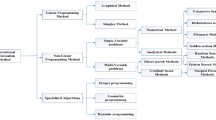Abstract
This paper presents the development of a hybrid approach as a solution to the multiple Traveling Salesman Problem (mTSP) applied to the route scheduling for self-drive cars. First, we use k-means to generate routes that equality distribute delivery locations among the cars. Then, these routes are set as the initial population for bio-inspired algorithms, such as Genetic Algorithm (GA) and Ant Colony System (ACS), which perform an evolutionary process to find a route which minimizes the overall distance while keeping the balance of individual tours of each car. The experiments were conducted with our route scheduling system in real and virtual environments. We compared our hybrid approaches using k-means in conjunction with GA and ACS against GA, ACS, and Particle Swarm Optimization (PSO) initialized with random population. The results showed that, as the number of cars and target locations increase, the hybrid modeling approaches outperform GA, ACS, and PSO without any pre-processing.











Similar content being viewed by others
Data availability
The data that support this study cannot be made available due to the fact that the test scenarios were generated in our centralized system. However, we can provide the developed system. If it is of interest to the reader of this article, he may contact the corresponding author.
References
Davendra D. Traveling salesman problem. Rijeka: IntechOpen; 2010. https://doi.org/10.5772/547.
Angel RD, Caudle WL, Noonan R, Whinston A. Computer-assisted school bus scheduling. Manag Sci. 1972;18(6):279–88.
Orloff CS. Routing a fleet of m vehicles to/from a central facility. Networks. 1974;4(2):147–62.
Christofides N, Eilon S. An algorithm for the vehicle-dispatching problem. J Oper Res Soc. 1969;20(3):309–18.
Savelsbergh MWP, Sol M. The general pickup and delivery problem. Transp Sci. 1995;29:17–29.
Alves RMF, Lopes CR. Using genetic algorithms to minimize the distance and balance the routes for the multiple traveling salesman problem. In: 2015 IEEE congress on evolutionary computation (CEC). 2015. p. 3171–3178. https://doi.org/10.1109/CEC.2015.7257285.
Xu X, Yuan H, Liptrott M, Trovati M. Two phase heuristic algorithm for the multiple-travelling salesman problem. Soft Comput. 2018;22:6567–81.
Sathya N, Muthukumaravel A. Two phase hybrid ai-heuristics for multiple travelling salesman problem. Int J Appl Eng Res. 2017;12:12659–64.
Yang C, Szeto KY. Solving the traveling salesman problem with a multi-agent system. In: 2019 IEEE congress on evolutionary computation (CEC). 2019. p. 158–65. https://doi.org/10.1109/CEC.2019.8789895.
Kocyigit E, Sahingoz OK, Diri B. An evolutionary approach to multiple traveling salesman problem for efficient distribution of pharmaceutical products. In: 2020 international conference on electrical engineering (ICEE). IEEE; 2020. p. 1–7.
Ozmen M, Sahin H. Real-time optimization of school bus routing problem in smart cities using genetic algorithm. In: 2021 6th international conference on inventive computation technologies (ICICT). IEEE; 2021. p. 1152–8.
Goldberg DE. Genetic algorithms in search, optimization, and machine learning. Boston: Addison-Wesley; 1989.
Clerc M. Discrete particle swarm optimization, illustrated by the traveling salesman problem. N Optim Tech Eng Stud Fuzziness Soft Comput. 2004;141.
Dorigo M, Gambardella LM. Ant colony system: a cooperative learning approach to the traveling salesman problem. IEEE Trans Evol Comput. 1997;1(1):53–66. https://doi.org/10.1109/4235.585892.
Jain AK. Data clustering: 50 years beyond k-means. Pattern Recogn Lett. 2010;31(8):651–66. https://doi.org/10.1016/j.patrec.2009.09.011.
Fernandes LC, Souza JR, Pessin G, Shinzato PY, Sales DO, Mendes CCT, Prado M, Klaser RL, Magalhães AC, Hata AY, Pigatto DF, Branco KRLJC, Grassi V, Osório FS, Wolf DF. Carina intelligent robotic car: architectural design and applications. J Syst Archit Embed Syst Des. 2014;60:372–92.
Funding
This study was funded by Federal University of Uberlândia, and by the CNPq (Grant No. 400699/2016-8).
Author information
Authors and Affiliations
Corresponding authors
Ethics declarations
Conflict of Interest
The authors declare that they have no conflict of interest.
Ethical Approval
This article does not contain any studies with human participants or animals performed by any of the authors.
Informed Consent
It does not apply to this article.
Additional information
Publisher's Note
Springer Nature remains neutral with regard to jurisdictional claims in published maps and institutional affiliations.
This article is part of the topical collection “Machine Learning Modeling Techniques and Applications” guest edited by Lazaros Iliadis, Elias Pimenidis and Chrisina Jayne.
Rights and permissions
Springer Nature or its licensor (e.g. a society or other partner) holds exclusive rights to this article under a publishing agreement with the author(s) or other rightsholder(s); author self-archiving of the accepted manuscript version of this article is solely governed by the terms of such publishing agreement and applicable law.
About this article
Cite this article
Silva, C.E., César, T.S., Gomes, I.P. et al. Scheduling System for Multiple Self-driving Cars Using K-Means and Bio-inspired Optimization Algorithms. SN COMPUT. SCI. 4, 647 (2023). https://doi.org/10.1007/s42979-023-02053-z
Received:
Accepted:
Published:
DOI: https://doi.org/10.1007/s42979-023-02053-z




